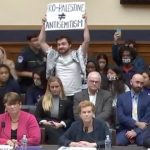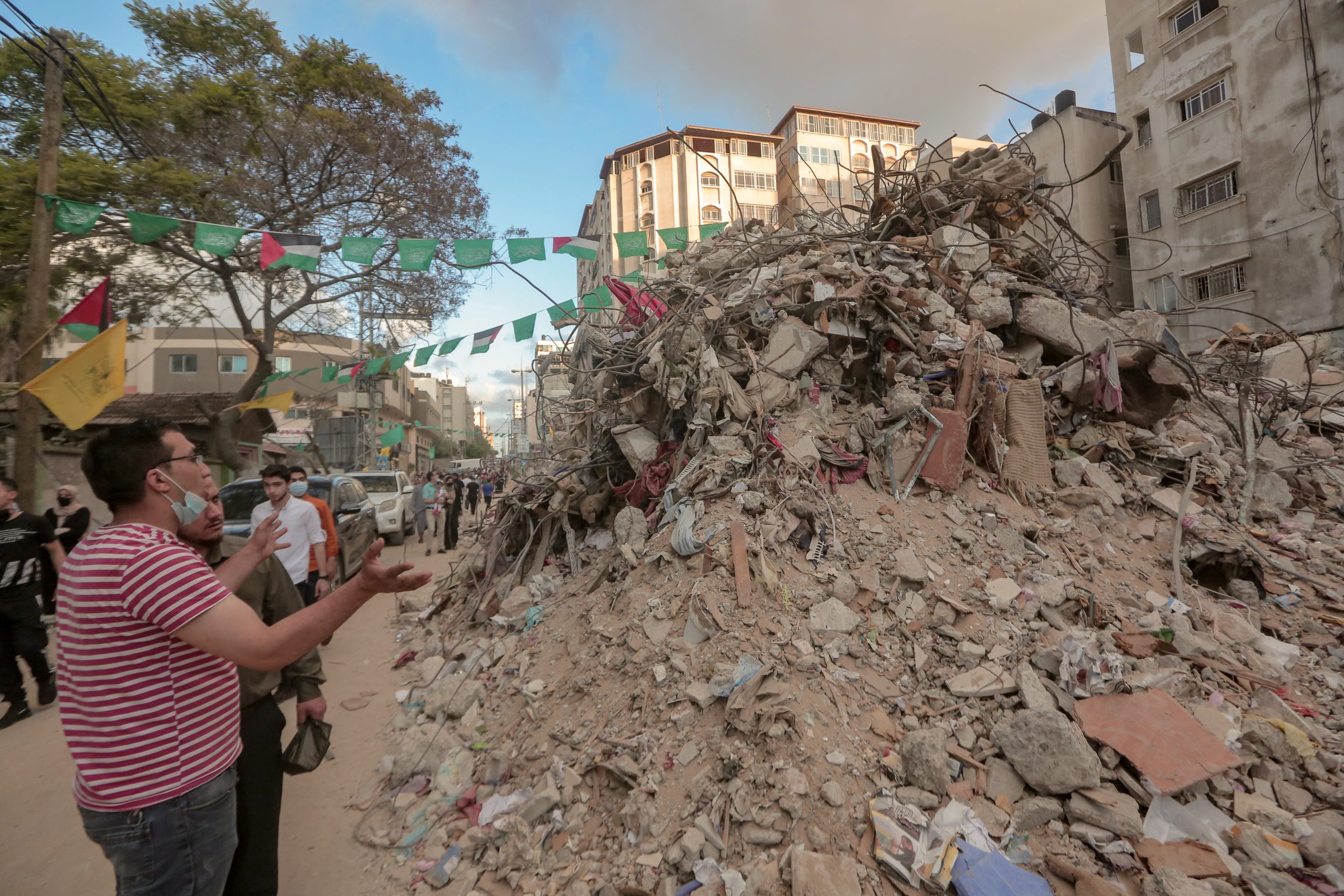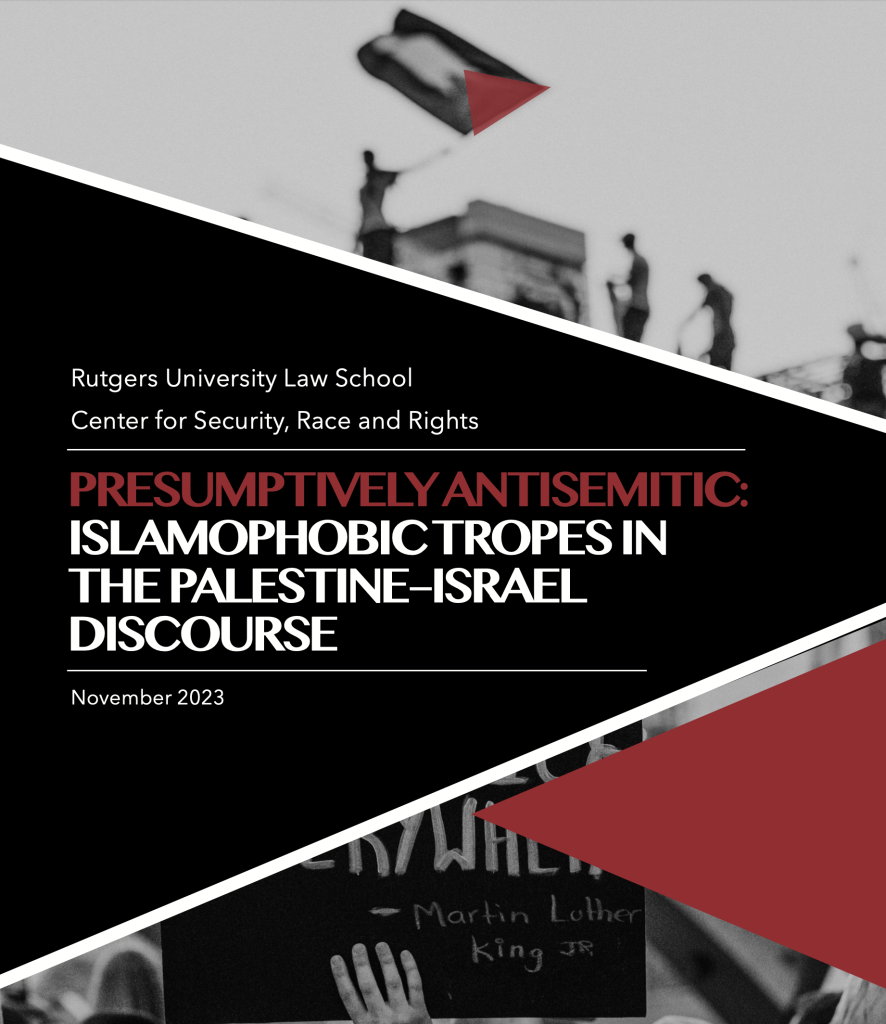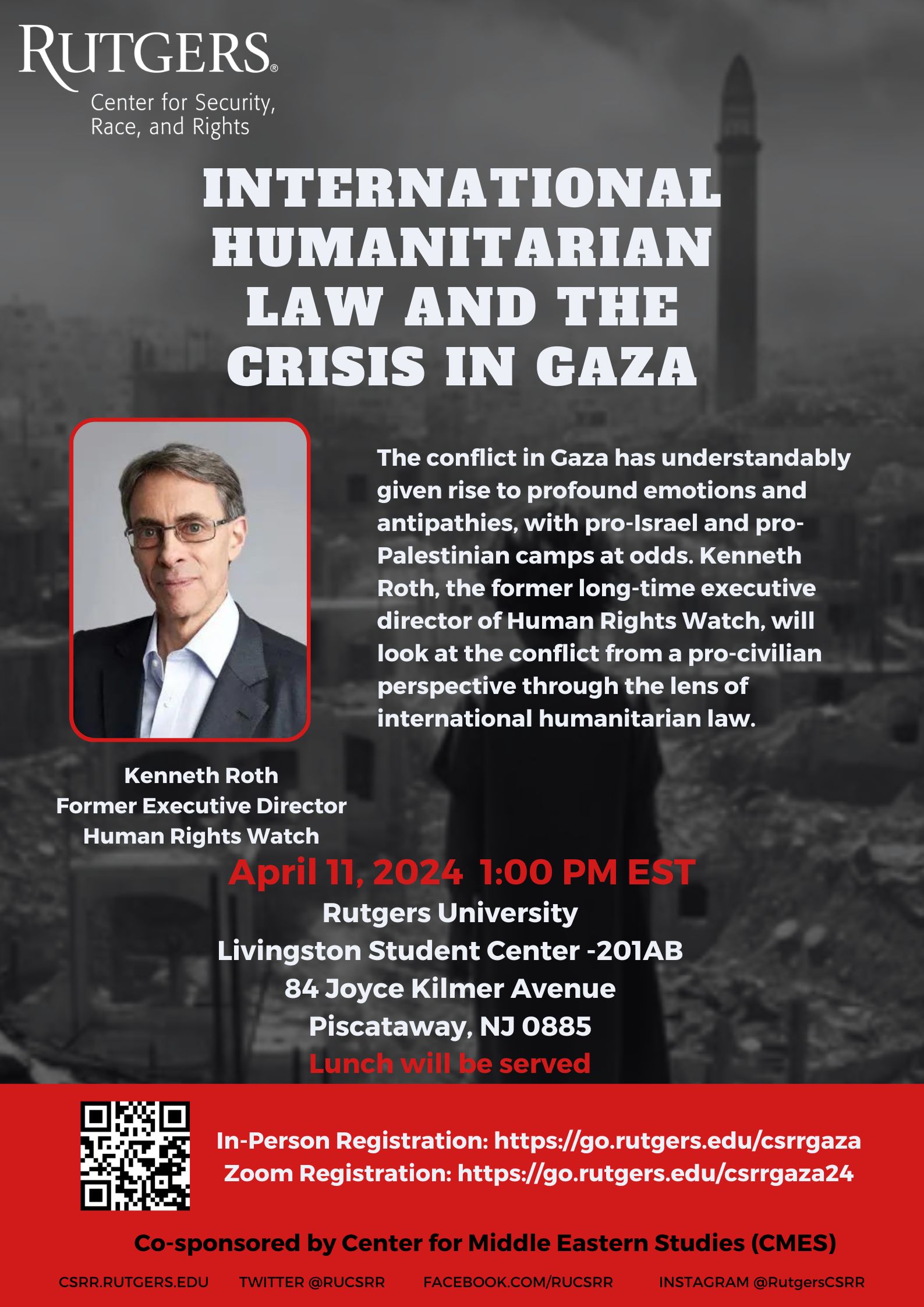The struggle for Palestinian rights has never been more important – or more dire.
The conflict has reached a turning point, as the year 2023 became the deadliest for Palestinians on record. In the Gaza Strip, Palestinians face an existential crisis. Leading genocide scholars, experts in international law, and respected human rights organizations have warned that the world is witnessing a genocide, unchecked war crimes, ethnic cleansing, and crimes against humanity by the state of Israel.
Simultaneously, the demonization of pro-Palestinian voices in the United States has risen to a fever pitch – particularly when those voices are Muslim and Arab. Zionists and Islamophobes attack critics of Israel’s policies and practices by conflating anti-Zionism with antisemitism and seek to censor discussions within the context of the 56-year-long illegal Israeli occupation and the Nakba. Instead, antisemitism is weaponized to silence and discredit advocates of Palestinian human rights.
Presumptively Antisemitic: Islamophobic Tropes in the Palestine-Israel Discourse examines an understudied and little-understood aspect of Palestine-Israel discourse: how Islamophobia works to fuel and sustain spurious allegations of antisemitism used by the Israel Lobby and its Zionist supporters to shame and silence critics of Israeli ethnic cleansing and apartheid.
While people of all faiths and ethnicities understand and empathize with the historic plight of the Palestinians, nowhere is pro-Israel bias more obvious than when directed against Muslim and Arab defenders of Palestinian human rights. And mainstream media often uncritically repeats such harmful, unsubstantiated claims against Arabs and Muslims.
Three recommendations for U.S. civil society, universities, and elected officials would help all those interested in confronting and countering both Islamophobia and genuine antisemitism – while maintaining necessary support for the human rights of Palestinians:
- Congress and the President must include the experiences and perspectives of Palestinian, Arab, and Muslim American communities in foreign policy development. U.S. foreign policy on Palestine and Israel currently excludes the lived experiences, analysis, and perspectives of Arabs (especially Palestinians) and Muslims. One-sided, biased input by pro-Israeli nonprofit organizations, elected officials, and analysts predictably dehumanizes Palestinians and exempts Israel from human rights norms.
- Universities must preserve academic freedom and free speech rights. When it comes to the topic of Palestine, students and faculty face overt hostility when they host events, conduct research, publish articles, or engage in campus activism. University administrators enable, or participate in, harassment of faculty and students. Specious administrative complaints of antisemitism coupled with malicious blacklisting by a nationwide Islamophobic network work to quash criticism of Israel.
- The U.S. government must hold Israel accountable for violations of Palestinians’ human rights. Ongoing violations of international law by Israel – such as settlement expansion, indefinite detention, extrajudicial killings, house demolitions, and collective punishment of the population of Gaza occur unchecked because the United States consistently looks the other way. Even U.S. domestic laws are flouted in order to craft human rights exceptions for the apartheid Israeli regime.
To read Presumptively Antisemitic: Islamophobic Tropes in the Palestine-Israel Discourse, click here.
Media Coverage
Islamophobia Is Ignored in Ferment over Anti-Semitism on Campus. KKFI 90.1 Kansas City. (2024). (interviewing Sahar Aziz).
Read more here.

The Islamophobia Network and the Israel-Palestine Discourse w/ Sahar Aziz and Mitchell PlitnickParallax Views w/ J.G. Michael. (interviewing Sahar Aziz and Mitchell Plitnick).
Read more here.

Unpacking Islamophobia: Five Questions on Islamophobia in Gaza Report. Sahar Aziz and Mitchell Plitnick. Bridge Initiative Team. (2024).
In Episode 12 of “Unpacking Islamophobia,” our guests for the March 2024 episode are Professor Sahar Aziz and Mitchell Plitnick who are co-authors of a November 2023 Rutgers University report from the Center for Security, Race and Rights called “Presumptively Antisemitic: Islamophobic Tropes in the Palestine-Israel Discourse,” which examines how anti-Palestinian racism and Islamophobia have been used to silence criticism of the Israeli government. Read more here.
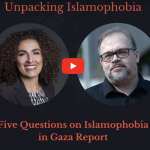
Presumptively Antisemitic: Islamophobic Tropes in the Palestine-Israel Discourse. CounterPunch Radio. (2024). (interviewing Sahar Aziz and Mitchell Plitnick.
This time on CounterPunch Radio we sit down with Sahar Aziz and Mitchell Plitnick, co-authors of “Presumptively Antisemitic: Islamophobic Tropes in the Palestine-Israel Discourse,” a critical new report published by Rutgers University Law School’s Center for Security, Race, and Rights. The conversation explores the political and social context for this report, as well as the timing of its release, published as it was against the backdrop of Israel’s genocidal war on Gaza. The discussion broadens beyond the report to explore various aspects of the Palestine issue and its continued central importance for the US and western countries, as well as for the “Middle East,” world politics and global affairs.. Read more here.
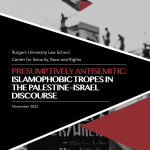
US Foreign Policy Establishment Is Instrumentalizing Islamophobia, Report Shows. Truthout. (2024). (interviewing Sahar Aziz).
An incisive new report released by researchers affiliated with Rutgers University lays out in detail the many ways in which the U.S. political establishment has instrumentalized anti-Muslim bigotry and disingenuously redefined the idea of “antisemitism” in order to defuse criticisms of the Israeli government and justify dehumanizing policies toward Palestinians. Titled “Presumptively Antisemitic: Islamophobic Tropes in the Palestine-Israel Discourse,” the 68-page report offers a thorough examination of how the domestic foreign policy establishment and the associated Israel lobby employ Islamophobia as a tool of ideological legitimation. Read more here.

Dehumanization and misinformation in service of genocide. Mitchell Plitnick. Mondoweiss. (2024).
Cutting off the funding for the United Nations Relief and Works Agency (UNRWA) just at the moment when its services are more desperately needed than at any point in its history is cruel beyond measure, and is, itself, an act of genocide. It cannot be anything else, as the known consequence of that cutoff under current circumstances will lead to massive numbers of deaths and an unimaginable increase in illness, injury, and profound trauma among the 2.2 million Palestinians in the Gaza Strip, not to mention the damage it will also do to Palestinian refugees in the West Bank, Jordan, Lebanon, and Syria who also rely on UNRWA’s services for daily needs. Read more here.

Islamophobia Palestine and the Presumption of Anti-Semitism. The Real News. (2024) (interviewing Sahar Aziz).
By now, the false equivalency between anti-Zionism and antisemitism—which Israel’s supporters use to give rhetorical cover for Zionism—is a well-worn topic on the left. What’s less discussed is the role of Islamophobia and anti-Arab racism in Zionists’ attempts to smear their critics, particularly Arab and Muslim ones, as antisemitic. A new report from Rutger University Law School’s Center for Security, Race, and Rights (CSRR) maps the use of Islamophobic tropes in the discourse on Israel-Palestine, noting that the racist association between terrorism and Arab and Muslim identity is intentionally invoked by Israel’s apologists. Michael Plitnick and Sahar Aziz join the Marc Steiner Show to discuss the new report and its contents. Read more here.
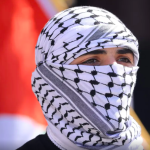
Ep. 248: Presumptively Antisemitic ft. Prof. Sahar Aziz. The Insurgents. (2024) (interviewing Sahar Aziz).
Prof. Sahar Aziz, Distinguished Professor of Law and Chancellor’s Social Justice Scholar at Rutgers Law and author of The Racial Muslim: When Racism Quashes Religious Freedom, joins us to discuss her recent report “Presumptively Antisemitic: Islamophobic Tropes In The Palestine-Israel Discourse.” We explore the ways Islamophobia spreads in the media and shifts the balance of conversation of coverage, resulting in a dehumanizing effect for Muslims, and how—especially in this moment—some genuinely pro-Palestinian advocacy is inaccurately framed as anti-Semitic. Read more here.
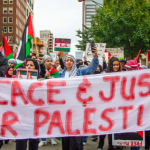
Islamophobic Tropes in the Palestine-Israel Discourse. Washington Report on Middle East Affairs.(2024) (interviewing Sahar Aziz).
The Center for Security, Race and Rights (CSRR) at Rutgers Law School hosted a virtual panel on Dec. 14, 2023, to launch its report, “Presumptively Anti-Semitic: Islamophobic Tropes in the Palestine-Israel Discourse.” The study examines how an “Islamophobia industry” of think tanks, non-governmental organizations (NGOs) and lobbying groups weaponizes anti-Semitism to smear Muslim supporters of Palestine as inherently prejudiced. Professor of law and CSRR director Sahar Aziz moderated the discussion, which included Mitchell Plitnick, president of ReThinking Foreign Policy, and Jonathan Matz, a Jewish Voice for Peace (JVP) board member. Read more here.
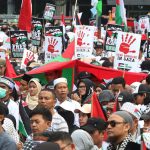
Antisemitism and Islamophobia In The US Political Discourse On Israel/Palestine. Middle East Focus. (2024) (interviewing Sahar Aziz and Mitchell Plitnick).
Sahar Aziz and Mitchell Plitnick discuss their study “Presumptively Antisemitic: Islamophobic Tropes in the Palestine Israel Discourse” with MEI’s Palestine and Palestinian-Israeli Affairs Program Director Khaled Elgindy. Read more here.

“Unconditional Supporters of Israel Know the Facts Are Not on Their Side”. Sahar Aziz. Jacobin. (2023).
A new report details how Islamophobia fuels conflations of criticism of Israel with antisemitism. We spoke with one of the report’s authors about the slanderous attempts to muzzle supporters of Palestinian rights. Read more here.

How a Leading Definition of Antisemitism Has Been Weaponized Against Israel’s Critics. Jonathan Hafetz & Sahar Aziz. The Nation. (2023).
Americans across the country have joined mass protests demanding a cease-fire to Israel’s siege of Gaza following Hamas’s October 7 assault on Israel. College students are conducting sit-ins, protests, and teach-ins reminiscent of the Vietnam anti-war movement. The chorus of criticism of Israel’s indiscriminate bombings and denial of food, water, and other humanitarian aid to 2 million Palestinians trapped in Gaza has only grown louder as the Palestinian death toll has skyrocketed beyond an estimated 22,000, nearly half of whom are children. Read more here.
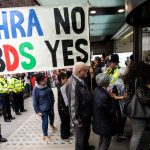
Report: Anti-Palestinian Racism & Islamophobia in Gaza War Coverage Bridge: Georgetown University. (2023) (interviewing Sahar Aziz).
In November 2023, the Center for Security, Race and Rights at Rutgers University published a comprehensive report called “Presumptively Antisemitic: Islamophobic Tropes in the Palestine-Israel Discourse,” which examines how anti-Palestinian racism and Islamophobia have been used to shame and silence critics of the Israeli government. The report’s executive summary notes that 2023 has become the deadliest year ever for Palestinians, with leading genocide scholars, international law experts, and global human rights organizations warning that the world is “witnessing a genocide, unchecked war crimes, ethnic cleansing, and crimes against humanity” by the right-wing government of Benjamin Netanyahu. Read more here.

Israel-Gaza: Does Islamophobia play a part in US foreign policy? Al Jazeera. (2023) (interviewing Sahar Aziz).
Marc Lamont Hill speaks with scholars of Islamophobia and anti-Semitism. As the war in Gaza rages on, the death toll keeps increasing and residents face starvation. Despite the heavy civilian toll, the United States keeps voicing its strong support for Israel. Criticism has been raised of Washington’s approach to Palestinian victims. Is there a double standard when it comes to Palestine? And why do some in the US seem to conflate solidarity with Palestinians with anti-Semitism? Read more here.
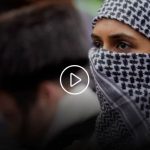
The Assassination Of Palestinian Poet Refaat Alareer & The Witch-hunt On College Campuses. Katie Halper. (2023) (interviewing Sahar Aziz).
Katie discusses the life, death and legacy of poet Refaat Alareer with his colleagues at Electronic Intifada, journalists Ali Abunimah and Nora Barrows-Friedman and his former student and current writer and translator Mahmoud Alyazji. But first Katie talks to law professor Sahar Aziz and writer and analyst Mitchell Plitnick about their new report “Presumptively Antisemitic: Islamophobic Tropes in the Palestine-Israel Discourse” which looks at how accusations of antisemitism stifle criticism of Israel and empower its systematic violations of Palestinians’ human rights. We also talk about the witch hunts and censorship on college campuses which are distracting from Israel’s crimes. Watch here.

Israel-Palestine war: US universities must resist this pro-Israel frenzy of censorship. Mohammad H Fadel. Middle East Eye. (2023).
The apocalyptic violence between Israel and Hamas that began on 7 October has claimed the lives of over 1,200 Israelis and 18,000 Palestinians. Hamas’s attack targeted Israeli military bases as well as civilians, killing and injuring hundreds. Hamas took scores of civilians hostage alongside Israeli military personnel. No doubt these actions against noncombatants are war crimes and cannot be justified. However, the atrocities committed by Hamas-led fighters on 7 October do not grant Israel immunity for its own – much longer and more violent – history of illegality against the Palestinians, prior to and after the Hamas attack. Read more here.
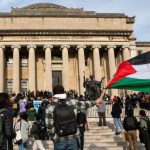
Unmasking the weaponization of Islamophobia in US foreign policy. Alexis Sterling. Nation of Change. (2023).
In a comprehensive and timely report from Rutgers University, researchers have laid bare the systemic use of Islamophobia in the U.S. political realm to influence public perception and policy regarding Israel and Palestine. Titled “Presumptively Antisemitic: Islamophobic Tropes in the Palestine-Israel Discourse,” the 68-page document, authored by Mitchell Plitnick of Jewish Voice for Peace and Rutgers law professor Sahar Aziz, provides an in-depth analysis of this phenomenon. Read more here.

“I’d rather be stabbed by daggers than be ruled by a rogue.” This line comes from one of the saddest and most beautiful folk songs released from Palestine. I thought about those words constantly when I was in Palestine this past summer. After four years of estrangement, as a plague swept across the planet, I finally returned to Palestine. I got to see my family again and I lived with them for less than a month while also traveling to every corner that I could. I even made it to Jerusalem for the first time in my life, after being continuously denied, and saw parts of Israel. After everything I bore witness to this summer, I can understand why someone would sing such a song. Read more here.
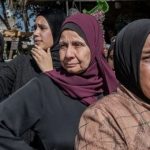
Don’t Stop Speaking About Palestine. Chamtuli Huq. Common Dreams. (2024).
Every Muslim American knows that speaking up for justice in Palestine means you are punished twice: You face Islamophobia as a Muslim and are defamed as antisemitic for criticizing Israel’s violations of Palestinians’ human rights. Read more here.
